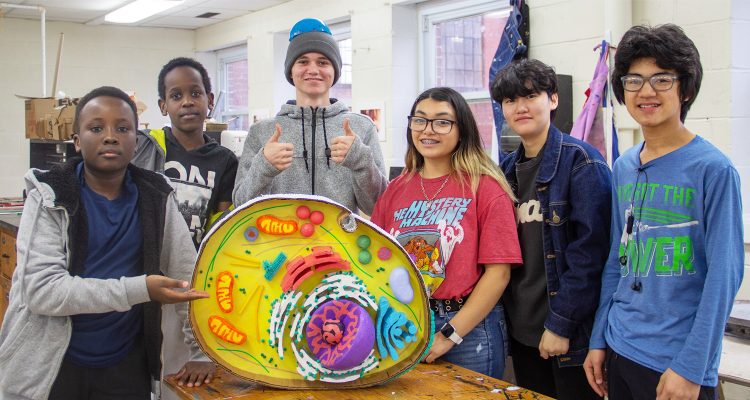And when these students are not at their desks, they’re outside in a greenhouse, picking organic vegetables they’ve grown and will soon eat, or tending to baby goats as they’re born into the world. The faces come from Africa, America, Asia; no one skin color dominates a classroom. In moments of group silence, students sit together in meditation and peace.
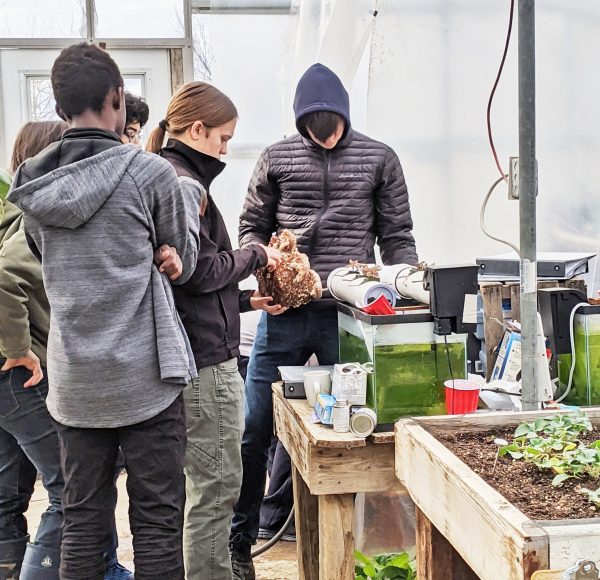
At Olney Friends School, a boarding and day high school offering a progressive education, in Barnesville, Ohio, this is already happening and has been, in some form, for almost 200 years. Established in 1837, Olney was founded on Quaker testimonies, and though it no longer operates through the Religious Society of Friends, life there focuses on the values of simplicity, peace, integrity, community, equality and stewardship.
THE VALUE OF PROGRESSIVE SUSTAINABILITY
While the word sustainability is trending these days, Olney students learn firsthand what it means to exist sustainably in the world. Olney is the only school in the United States with a certified organic farm, and farming is a significant part of students’ experience. In addition to the main school building and dorms, the campus is dotted with greenhouses, hoop houses and livestock barns. These do not exist simply for teaching purposes; they’re working parts of the Olney farm, tended by students with faculty guidance. The faculty members also do office work and farm chores.
Head of School Christian Acemah, an Olney graduate from Uganda, believes that farming offers a unique experience for young people.
“This has been a big part of our school since it was started, because it’s the Quakers who started the school, and they were farmers,” he said. “Since time immemorial, students have learned different things on the farm. We used to have a dairy when I was a student. It was 5 a.m., waking up to shovel dung and milk cows, and so now there are the goats, the chickens, students collect the eggs.”
He said Olney continues to expand its farming program with a new agricultural sciences class this year. Acemah believes these experiences let students appreciate where their food comes from. They understand the cycle of growth and death, both in scientific and spiritual terms.
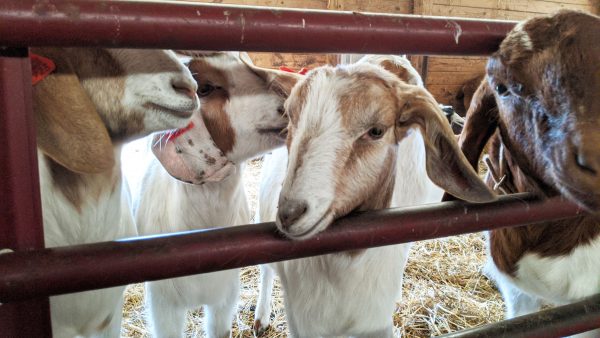
Acemah said Olney holds dearly to its organic certification and intends to keep expanding its agricultural programs, despite the costs. Soon, the school will grow much of its own food, as an assistant farmer will be on board in June. Currently, there are 800 pounds of beef in the freezers, and they buy the rest from local sources.
Not all students get excited about the farming component of a progressive education at Olney . According to Acemah, sometimes they learn to appreciate and enjoy the farm work. Others never do, but he says that’s OK. They don’t need to love it to learn from it.
“We are always pushing our students to grow and pushing them out of their comfort zones,” he said. “Sometimes they don’t like it. Many have that immunity to change. That’s why Olney is here. And it teaches them that sometimes you have to do things that you don’t want to do.”
This ethic fits with the Quaker value of stewardship. While all students perform both indoor and outdoor work, farm chores are also an option for those who may not want to join a traditional athletic team. Olney’s Farm Team does whatever has to be done on campus, and this can include clearing a cow pasture, planting garlic or clearing algae out of the lake. It’s a way to serve, exercise and be outdoors in a non-competitive environment.
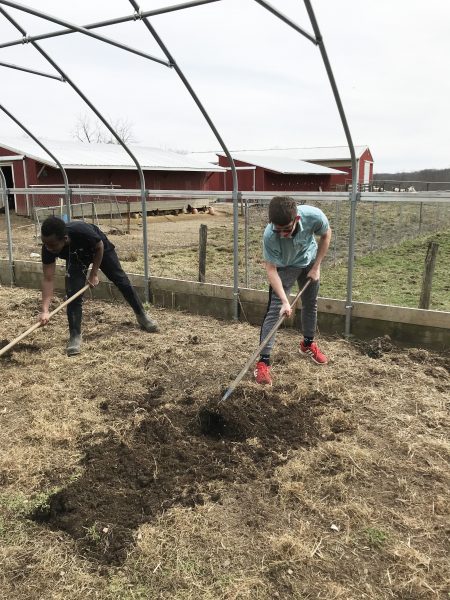
A PROGRESSIVE APPROACH TO ACADEMICS
Olney Friends School approaches academics from a transdisciplinary perspective. This means combining disciplines that talk about the same sorts of topics. Rather than offering traditional math, English or art classes — none of which are particularly relevant to each other — all classes at Olney revolve around a central theme or question. Students are taught to take individual moments of learning and consider them on a larger scale.
“You have to make sure that you add arts, sciences, humanities, your farm work — they are all integrated and are all responding to the questions that transcend those disciplinary boundaries,” Acemah said. He explained that in the first year, students approach a classic question: What is knowledge? Different classes will approach the question from different directions, but the faculty members work together to make their content respond to it. The subjects talk to each other, so to speak.
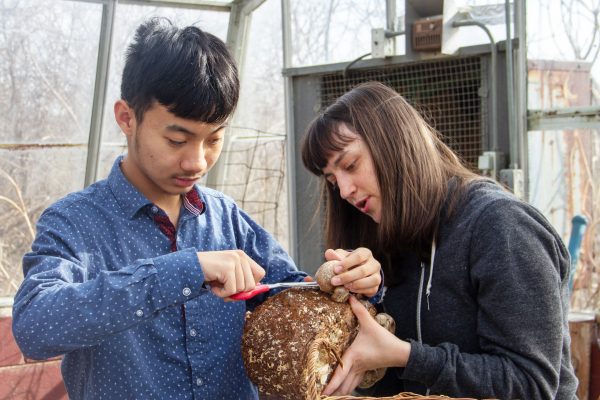
In the second year, students consider how one gains and uses that knowledge. By the third year, as students prepare to move on from Olney, they think about their place in the environment. As seniors, the question becomes: What is global stewardship?
Students might not see the greater purpose for these big questions, but studies today become wisdom tomorrow. The faculty knows the lessons will stay with Olney graduates long after they’ve left.
According to Jasmin Ilovar, director of admissions and communications, “We’re not just going to teach you to be an engineer or a banker or a teacher. We want you to know how your occupation will affect the community. So, for example, an engineer is going to build a bridge. How will that bridge influence the community around you? How will it affect the environment? We try to provide that holistic sort of education and [promote] the Quaker values that we hold dear. We value humanity.”
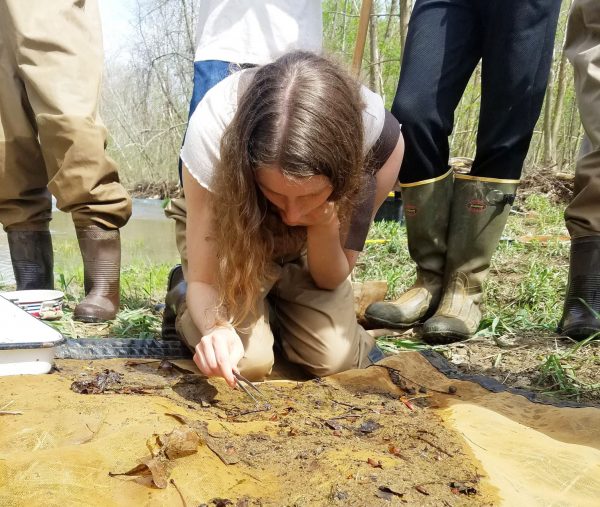
Leonard Guindon, dean of academics and a math and science teacher, calls it thinking globally and acting locally. His students gain real-world science experience by utilizing a nature-made outdoor classroom — the Captina Creek watershed, which drains the southern third of Belmont County into the Ohio River. Within the watershed are coal mines, oil and gas wells, farms and forest. It’s not just forestry, it’s aquatic ecology, chemistry, biology and fossil fuel issues. Thus, students will not only focus on each of these aspects of the watershed but also consider how the health of the watershed affects quality of life and the environment as a whole.
Guindon admits that the big picture can be overwhelming, even grim at times.
“My biggest challenge,” he said, “is just to give them some hope and not let them get discouraged about the state of the planet.” To that end, many activities are designed for both learning and fun. In the late winter, for example, students collect sugar maple sap and boil it into maple syrup. It’s palatable science in an outdoor classroom, which can be a necessary respite from heavy thinking. Olney teachers seek that balance.
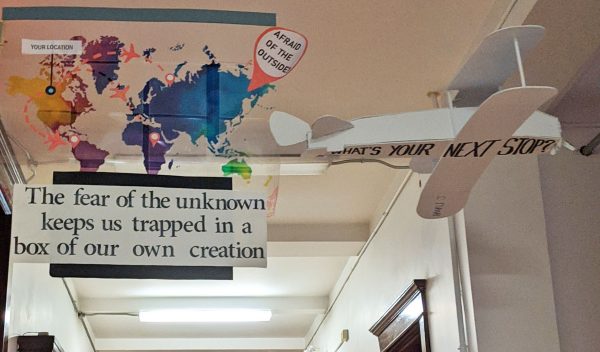
A PROGRESSIVE OHIO COLLEGE PREP HIGH SCHOOL
In addition to its unique curriculum and setting, Olney Friends School prepares students for college.
“We have classes that are being taught at the college level, and things are being asked of students beyond the classroom that are at the college level,” Acemah said. “And so it’s my hope that that kind of modeling for the students, and getting them experience at life when they’re here, will help them survive college. Of course, a freshman in college will always be a freshman in college, but they won’t get there and say, ‘I can’t handle this.’ They will know how to deal with that situation.”
Acceptance to a four-year institution is a graduation requirement. It holds students accountable for their own futures. Whether or not they actually attend college, each Olney grad will have gone through the application process, written the required essays and planned for the next step in their lives. Faculty members offer support during this process, but many students easily handle it on their own. They see the fruits of their labor when their acceptance letters arrive. The school gives them the tools they will need; what they do with those tools is up to them.
“While we prepare students to thrive at college, we are also aware that not all students want to go to college right after Olney. Some of them may never go to college, so we are also aware of and support students to figure out what else they could do after Olney even though we still require them to get accepted to college,” he said.
WHAT YOU’LL SEE AT OLNEY FRIENDS
On any given day, a tour of Olney Friends School will probably look something like this:
In the main building, students are in their classrooms, often engaged in a Harkness discussion. Harkness is a teaching and learning method that places students and instructors on the same level, seated in a circle to promote open discussion. In art class, a student is building a 3-D model of a cell she’s studying in biology.
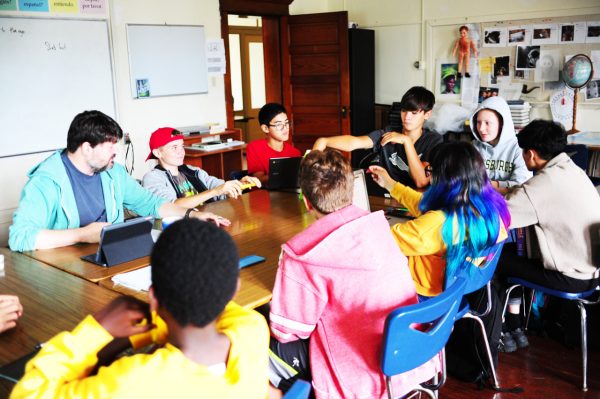
In the greenhouse, a class gathers around an indoor pond where they’ve been growing mushroom blocks and experimenting with aquaponics, the result of which will hopefully be an organic lettuce harvest. (Failure is an equally powerful teacher. When a problem arises, students are taught to work around it.) In the next room waits an enormous basket of freshly collected eggs, ready to be washed and taken to the kitchen. Down in the hoop house, kids turn over the soil in preparation for planting. In late winter, they chop wood to keep the fire going for the maple syrup. In April, students take shifts in the goat barn for kidding duty as the goats are due to give birth.
Life at Olney Friends School is unique. It’s a place where leadership and responsibility come together in the time-honored tradition of Quaker stewardship. Olney students don’t just learn, they grow. They live and work together in preparation for their lives to come. And above all, they begin to understand who they are and find their place in the world.
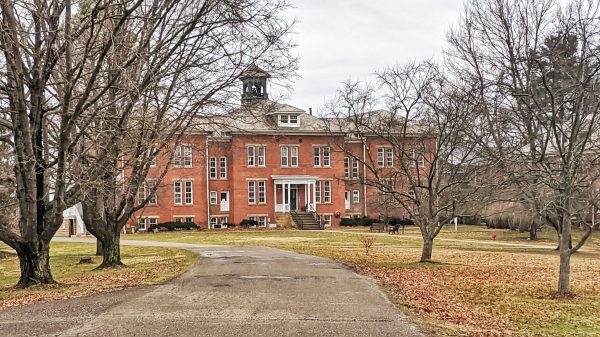
• Laura Jackson Roberts is an environmental writer and humorist in Wheeling, West Virginia. She holds an MFA in creative writing from Chatham University and serves as the Northern Panhandle representative of West Virginia Writers. Her hobbies include hiking, travel and rescuing homeless dogs. Visit her at laurajacksonroberts.com.


